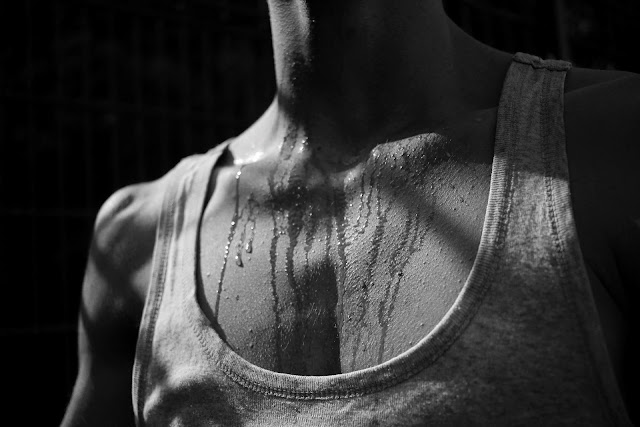Sweating more makes you burn more calories?
Sometimes you see people going out for a run wrapped in plastic or with a lot of clothes. Does that mean that sweating a lot during exercise makes you lose more weight by burning more fat? Let's learn about sweating and exercise and discover if this myth is true or false.
 |
| Sweating helps cooling down our body temperature |
WHY DO WE SWEAT?
Sweating is the way our body regulates the temperature. When our body temperature raises, we release water and salt, which evaporates and helps to cool you down.
SWEAT BURNS CALORIES?
Sweating itself doesn’t burn a measurable amount of calories, but sweating out enough liquid will cause you to lose water weight, not fat. This water weight will only be a temporary loss, though. Once you rehydrate by drinking water or eating, you’ll immediately regain any lost weight.
Anyway, doing physical activity raises your body temperature, so sweat can be a good indicator of the intensity of the exercise (you sweat more when your body temperature is higher), and in that case, sweating could mean that you're working out hard and therefore burning lots of calories. Still, you can also burn calories during activities where you sweat very little, or nothing. For example, you still burn calories swimming, lifting light weights, or exercising when it’s cold outside in the winter.
WHY DO SOME PEOPLE SWEAT MORE THAN OTHERS?
There are many factors that can influence how much you sweat:
- Genetics
- Environmental factors
- Age
- Fitness level
- Weight
Of these factors, your weight and fitness level will most influence how much you sweat during exercise. Your body needs to use more energy to function at a higher weight. This results in more sweat, because there’s more body mass to cool down.
 |
| Staying hydrated is fundamental for a good sports training |
Also, interestingly, the better shape you’re in, the quicker you’ll sweat. That’s because the body becomes more efficient at regulating temperature. Sweating earlier means your body can cool down faster. This lets you work out for a longer time at a more rigorous pace.
So, based on what we've learned, we can say that yes, sweat can indicate how intense our exercise is, but it's the exercise itself (not the sweat!) what makes our body burn calories to get the energy needed to run, lift weights or smash a volleyball. The sweat will make you lose water weight, and it's very important that you hydrate yourself enough after an intense activity, to help repair the body.
Going back to the runner wrapped in plastic or covered in warm clothes, we can tell them that sweating more will cause more loss of water weight. This causes dehydration, which will make them feel tired and dizzy, and suffer from muscle cramps and lower performance.
For all these reasons we can conclude that it's NOT RECOMMENDED to do exercise with extra clothes or trying different ways to sweat more, because that won't make you burn more fat, and instead, it will lower your performance and be harmful for your body. The MYTH is officially BUSTED!
To finish, remember that the World Health Organization (WHO) recommends teenagers to do at least 60 minutes of medium-high intensity physical activity every day, and that will probably make you break a sweat, so don't forget to hydrate yourself properly!
REFERENCES
Chertoff, J. (2017, November 8) Does sweating make you burn more calories? Retrieved from http://www.healthline.com
World Health Organization (n.d.) Global Strategy on Diet, Physical Activity and Health. Retrieved from http://www.who.int
Comentarios
Publicar un comentario